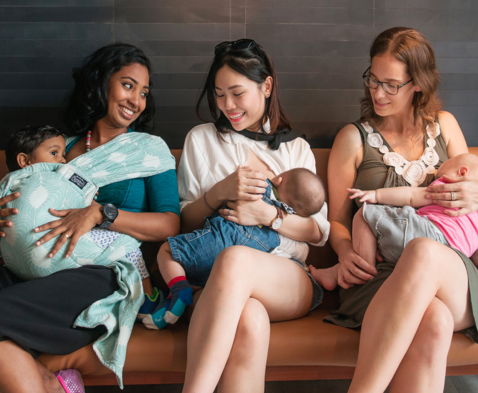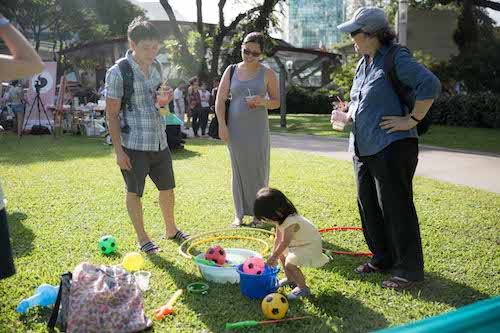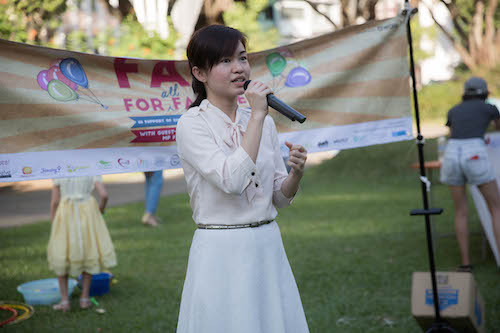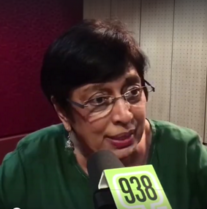 AWARE submitted its feedback in response to the public consultation on the Elected Presidency, which opened on 18 February 2016. The letter below was sent from our Executive Director to the Constitutional Commission Secretariat.
AWARE submitted its feedback in response to the public consultation on the Elected Presidency, which opened on 18 February 2016. The letter below was sent from our Executive Director to the Constitutional Commission Secretariat.
I write as the Executive Director of the Association of Women for Action and Research (AWARE), Singapore’s leading gender equality advocacy group. Founded in 1985, AWARE engages in service provision, research, advocacy and public education to realise our vision of a society where everyone, regardless of gender, can reach their full potential.
This letter sets out my feedback in response to your consultation on the Elected Presidency, which opened on 18 February. It reflects AWARE’s concern with promoting openness, inclusiveness, citizen participation and transparency in Singapore. As the foundation for the lawful exercise of all power, the Constitution has a strong bearing on how those values can be realised in our society.
I make six key points in my submission.
- Custodial role versus representative role
For my first point, I note a possible tension in two distinct functions of the Presidency, namely (1) “the President’s custodial role in safeguarding our financial reserves and the integrity of our public service” (cited in 2(a)(i) of your consultation document) and (2) the President’s symbolic role as a representative and unifying figure as Head of State.
The responsible discharge of the custodial role arguably demands certain technical competences in terms of financial and administrative knowledge and experience. These qualities are frequently associated with positions of leadership in formal organisational hierarchies, which is the justification offered for the stringent eligibility criteria currently set out in Art 19(2)(g) of the Constitution. On the other hand, Singapore’s population is not composed primarily of individuals in such positions, who are by definition a small minority who already enjoy especially high levels of influence and, typically, wealth. Reserving the office of Head of State solely to candidates who have once held other offices of the highest nature causes it to appear exclusionary and limited, even elitist, rather than representative.
The tension between these two functions is not easily resolved. However, I submit that the balance is currently weighted too far in favour of seniority of prior positions (assumed to be necessary for function (1)), at the expense of possible representativeness (function (2)). The Article 19(2)(g) criteria are too narrow and should be meaningfully broadened to widen the pool of potential candidates. For example, individuals who have held any of the following posts could be included:
- Sub-Cabinet appointees such as Ministers of State (not just full Ministers)
- Members of Parliament who have served a given number of years – however, they should not be partisan, so elected MPs or NCMPs should only be eligible to run for President three years after their last parliamentary term
- Senior members of the judiciary (not just the Chief Justice)
- More top-ranking public servants, such as senior ambassadors and Superscale civil servants (not just Permanent Secretaries)
- Top-ranking administrators of any enterprises with substantial budgets, such as the chief executives of hospitals, universities or large voluntary welfare organisations. This includes the chairs and chief executive of any statutory board that meets a minimum budgetary criterion (rather than having a small, exhaustive list of relevant statutory boards, as is presently the case)
Below I will elaborate more on why I think this can be done without threatening the integrity of the President’s custodial role.
- Custodial role – financial expertise versus political judgment
The custodial role of the President is vital and the eligibility criteria should reflect the grave responsibility invested in the office. However, in fulfilling this role, the President is not simply bringing expertise to bear on value-neutral decisions which have single, correct answers to be determined solely by applying technical competence. Decisions on public service appointees and the use of the reserves involve political judgment calls. While the President is non-partisan, when the electorate cast their votes for the President, they are entrusting that individual with a mandate based on political values and a political vision. In other words, the qualifications to fulfil the custodial role are not solely of a technical nature.
Article 19(2)(g) as it stands is directed at general organisational experience and capability, not necessarily a single highly specialised form of acumen, such as financial acumen. This is clear from the fact that the potential candidates could be drawn from a range of fields. For example, a former Chief Justice has primarily legal experience and may not be a financial expert. A former chair or chief executive of a large company has primarily business acumen and may not be any kind of legal expert. A former Minister might not have any specialist expertise in either field. I suggest that it is consistent with this generalist approach to expand the pool to include other highly qualified and experienced candidates, beyond those currently listed.
For these reasons, I also support lowering the level of paid up capital stated in Article 19(2)(g)(iii) from $100 million to $50 million. It should not, in any case, be raised beyond $100 million.
It is also important to note that the President frequently does not act alone, but on the advice of Cabinet or the Council of Presidential Advisers (CPA). Advice from the CPA has considerable influence, as it can make the difference between an unassailable presidential veto and one that can be overturned by Parliament. I suggest that any indispensable specialist expertise can be more suitably brought to the presidential decision-making process through appointments to the CPA, rather than by limiting the pool of potential presidential candidates too severely.
In this sense, the President’s role would parallel that of Ministers. Ministers may not necessarily be the most qualified subject matter experts in their portfolio: rather, they make decisions in accordance with their political vision and democratic mandate, as advised by the relevant public servants who do have the relevant expertise.
- Gender equality and the Presidency
The current eligibility criteria pose a particular threat to the representativeness of the Presidency by making it extremely difficult for a woman to be elected to the role, even though women are half of Singapore’s population and ought ideally to find a concomitant level of representation in the office of Head of State.
Article 19(2)(g) as it stands is a barrier to adequate female representation. In all of Singapore’s history there have only been two full female Cabinet Ministers. There has never been a female Chief Justice, Attorney-General, Accountant-General, Auditor-General or Chair of the Public Service Commission (PSC). While there are women who fulfill the other criteria, they are extremely few in number – with women forming, for example, only 26% of Permanent Secretaries.
Given the doubts raised above as to the stringent criteria of the current Article 19(2)(g), one benefit of expanding the pool of possible candidates would be to allow for more women as possible Presidents, enhancing the representativeness and inclusiveness of the office. Just to raise a few example, it does not make sense to prevent the electorate from even considering women of such experience, standing and talent as Dr Noeleen Heyzer (formerly Under-Secretary-General of the United Nations and formerly United Nations Secretary-General’s Special Adviser for Timor-Leste), Mrs Yu-Foo Yee Shoon (formerly Minister of State, six-term Member of Parliament and Board member on several statutory boards) or Dr Kanwaljit Soin (the initiator of groundbreaking anti-violence legislation as an NMP).
I also note with disappointment that the CPA has been, for the entirety of its history, 100% male. I urge you to consider mechanisms for ensuring a greater level of gender diversity in appointments to this body.
- Reduce the powers of the Presidential Elections Committee (PEC)
I have two main observations on the role of the PEC.
First, I acknowledge that under Article 19(2)(g)(iv) of the Constitution, the PEC has the power to expand the pool of potential candidates beyond the confines of the other criteria. On the surface, this seems to be a possible alternative to expanding the eligibility criteria to achieve the other aims of greater representativeness and gender equality. However, in my view, this is not adequate. The exercise of this discretion by the PEC is opaque and unpredictable. It is a body of only three individuals, all of whom are appointed rather than elected, and it need not account to the public for decisions made to allow or disallow any given candidate. Given the gravity of this decision – whether someone can stand for President – it should not be made in this unaccountable manner.
Second, I recommend the removal of Article 19(2)(e), which tasks the PEC with deciding whether a candidate “is a person of integrity, good character and reputation” sufficient to be a candidate for presidential election. If the PEC determines that the candidate does not meet this qualification, they are barred from standing. In my view, the matters of “integrity, good character and reputation” are for the electorate to assess. These are precisely the issues of values and vision which should be left to the democratic process, in contrast to questions about the technical competence or specialist skills of a candidate, which might in some case be more amenable to assessment by appointed experts.
I hold this view in particular because of the concentration of power in the Chair of the PSC. This is an appointed, not an elected office. Under the present Constitution, the PSC Chair is a member of the PEC (and thus able to disqualify potential presidential candidates), but also appoints one of six members of the CPA (whose advice has the legal power to affect the presidential veto). This structure places too many related presidential functions in the hands of one person, which is an inappropriate set-up regardless of the quality of the individual concerned.
- Diversity and equality in society at large
I realise that my fifth point does not directly come under your purview, but I wish to raise it as an important issue as we consider our vision for this important office. I began by noting that the President is of great symbolic value – a representative of the State and its people. You, too, describe the President as “a unifying figure that represents multi-racial Singapore”. Yet it is clear that under the current Constitution, it is a struggle to locate a pool of potential candidates that genuinely reflects the make-up of multi-racial Singapore, a Singapore that is also half women.
Changes to the structure of the Elected Presidency may not be the best or even an appropriate mechanism for addressing the deep-rooted structures that affect gender and racial equality in Singapore. Nevertheless, the fact that disproportionately few women or racial minority men can be found occupying the highest offices of the land ought to give us pause for thought about just how far our society may be from truly offering fair and equal opportunities to everyone in it.
- Public education on the Presidency
It has also become clear through the discussion surrounding possible changes to the Presidency that much more public education is needed on the role of the President, the various functions attached to the office, the day-to-day practicalities of how these responsibilities are discharged, and how the supporting structures such as the CPA and PEC operate. For the electorate to exercise their votes meaningfully, they need to know what they are voting their preferred candidate in to do, and how the successful candidate will be, variously, constrained or supported. The state has an important role to play in ensuring that there is more general awareness and understanding of these issues.
Thank you for your kind consideration of my submission. As this matter is of great public interest, I would like to give you notice that I shall publish these written representations online to promote open discussion of these concerns. I am also willing for you to make them available for the public record in their entirety and quoted as necessary with the exception of my IC and personal contact details. Moreover, I am happy to provide oral representations to the Constitutional Commission at a public hearing in English if invited.
Yours faithfully,
Corinna Cecilia Lim
Executive Director, AWARE
 We are holding an event about the Protection from Harassment Act (POHA) and the Tripartite Advisory on Managing Workplace Harassment and how we have been involved, as well as to tell you about Catalyse Consulting, the expanded Corporate Training arm of AWARE.
We are holding an event about the Protection from Harassment Act (POHA) and the Tripartite Advisory on Managing Workplace Harassment and how we have been involved, as well as to tell you about Catalyse Consulting, the expanded Corporate Training arm of AWARE.



 The Singapore Advocacy Awards is hosting its first event of 2016, “Intercultural Encounters in Singapore” on 16 April. Singapore has been a hotpot of cultures since time immemorial. Within our multiracial and multireligious society, how do different groups and cultures understand and accommodate each other? How are social prejudices created and maintained in Singaporean society?
The Singapore Advocacy Awards is hosting its first event of 2016, “Intercultural Encounters in Singapore” on 16 April. Singapore has been a hotpot of cultures since time immemorial. Within our multiracial and multireligious society, how do different groups and cultures understand and accommodate each other? How are social prejudices created and maintained in Singaporean society? Implementation of the Silver Support scheme has sparked debate on the merits of greater financial support by the state for the elderly poor (“
Implementation of the Silver Support scheme has sparked debate on the merits of greater financial support by the state for the elderly poor (“

 This afternoon’s Budget speech by Minister of Finance Heng Swee Keat took limited, tentative steps to a more “caring and resilient society”, but missed an opportunity to be bolder and more robust in supporting care and promoting equality, said the Association of Women for Action and Research (AWARE).
This afternoon’s Budget speech by Minister of Finance Heng Swee Keat took limited, tentative steps to a more “caring and resilient society”, but missed an opportunity to be bolder and more robust in supporting care and promoting equality, said the Association of Women for Action and Research (AWARE). AWARE submitted its feedback in response to the public consultation on the Elected Presidency, which opened on 18 February 2016. The letter below was sent from our Executive Director to the Constitutional Commission Secretariat.
AWARE submitted its feedback in response to the public consultation on the Elected Presidency, which opened on 18 February 2016. The letter below was sent from our Executive Director to the Constitutional Commission Secretariat. On 12 March 2016, we held Fair For All Families, a community carnival in support of single parents and their children, in commemoration of International Women’s Day. We’re heartened to witness the overwhelming support for single parents at the carnival. Over 400 people gathered at Hong Lim Park that very sunny Saturday and were treated to an afternoon of exciting activities, from a parent-child painting class, to yoga, to moving speeches by single-parent families.
On 12 March 2016, we held Fair For All Families, a community carnival in support of single parents and their children, in commemoration of International Women’s Day. We’re heartened to witness the overwhelming support for single parents at the carnival. Over 400 people gathered at Hong Lim Park that very sunny Saturday and were treated to an afternoon of exciting activities, from a parent-child painting class, to yoga, to moving speeches by single-parent families. We were very lucky to have had an outpouring of support from our generous sponsors comprising commercial partners, small-business owners and NGOs, who provided us with freebies and vouchers to be given out exclusively to single-parent families.
We were very lucky to have had an outpouring of support from our generous sponsors comprising commercial partners, small-business owners and NGOs, who provided us with freebies and vouchers to be given out exclusively to single-parent families.


 Dr Kanwaljit Soin, one of the founding members of AWARE, spoke to
Dr Kanwaljit Soin, one of the founding members of AWARE, spoke to